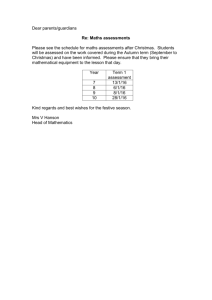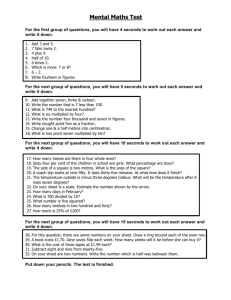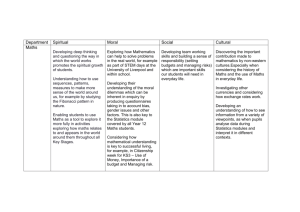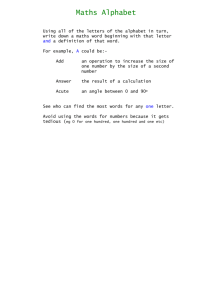Key task word glossary
advertisement
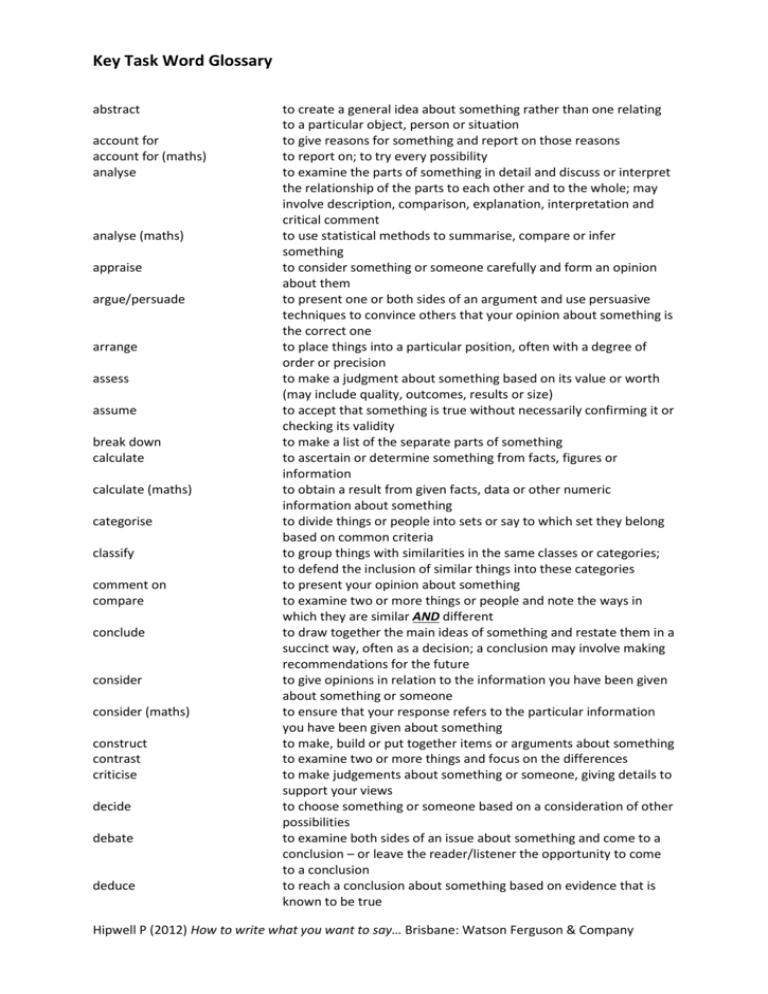
Key Task Word Glossary abstract account for account for (maths) analyse analyse (maths) appraise argue/persuade arrange assess assume break down calculate calculate (maths) categorise classify comment on compare conclude consider consider (maths) construct contrast criticise decide debate deduce to create a general idea about something rather than one relating to a particular object, person or situation to give reasons for something and report on those reasons to report on; to try every possibility to examine the parts of something in detail and discuss or interpret the relationship of the parts to each other and to the whole; may involve description, comparison, explanation, interpretation and critical comment to use statistical methods to summarise, compare or infer something to consider something or someone carefully and form an opinion about them to present one or both sides of an argument and use persuasive techniques to convince others that your opinion about something is the correct one to place things into a particular position, often with a degree of order or precision to make a judgment about something based on its value or worth (may include quality, outcomes, results or size) to accept that something is true without necessarily confirming it or checking its validity to make a list of the separate parts of something to ascertain or determine something from facts, figures or information to obtain a result from given facts, data or other numeric information about something to divide things or people into sets or say to which set they belong based on common criteria to group things with similarities in the same classes or categories; to defend the inclusion of similar things into these categories to present your opinion about something to examine two or more things or people and note the ways in which they are similar AND different to draw together the main ideas of something and restate them in a succinct way, often as a decision; a conclusion may involve making recommendations for the future to give opinions in relation to the information you have been given about something or someone to ensure that your response refers to the particular information you have been given about something to make, build or put together items or arguments about something to examine two or more things and focus on the differences to make judgements about something or someone, giving details to support your views to choose something or someone based on a consideration of other possibilities to examine both sides of an issue about something and come to a conclusion – or leave the reader/listener the opportunity to come to a conclusion to reach a conclusion about something based on evidence that is known to be true Hipwell P (2012) How to write what you want to say… Brisbane: Watson Ferguson & Company defend define define (maths) demonstrate describe devise differentiate differentiate (maths) discriminate distinguish discuss elaborate evaluate evaluate (maths) examine exemplify explain expound extend extract extrapolate extrapolate (maths) generalise generalise (maths) identify illustrate indicate infer/interpret investigate justify justify (maths) list order to argue in support of something to show, describe or state clearly what something is and what its limits are to give the meaning or precise description of the concept to show something by example to give a detailed account of the properties/qualities/features or parts of something or someone to have an idea for something and design and plan it to recognise or show the differences between one thing or person and another to find a derivative to recognise that two things or people are different to draw attention to, and make note of, the distinct differences between things or people to consider both sides of an issue about something, without necessarily coming to a conclusion to give more information or detail about something or someone to give a considered judgement about the value or worth of something or someone, and support it with evidence to find the exact value of something to look at something carefully, often for reasons ‘how’ or ‘why’ something may have happened to give more information or details about something to make the reader understand something by giving reasons for both ‘how’ and ‘why’ things are as they are to present a clear and convincing argument for a definite and detailed opinion about something to include or affect other people or things to obtain information from a larger amount or source of information to use known facts about something and use them as a basis for general statements about a situation or what is likely to happen in the future to extend a graph to obtain additional values to develop a broad statement that seems to be true in most situations or for most people; this does not include details such as evidence or examples using particular examples of something to develop an equation or mathematical model to describe the overall situation to notice or discover the existence or presence of something or someone to use examples of something to give more detail to information or more weight to an argument to point out something from available information to use what is provided to make meaning or arrive at an answer, to uncover the answer even though it is not directly said or stated to examine the reasons for something to show or prove that a decision, action or idea about something is reasonable or necessary by giving sound, plausible and logical reasons for it; answers the question ‘why’ to give all the logical reasons and/or mathematical arguments that have led to a decision arranging related items in order, usually under one another to arrange things in a logical way Hipwell P (2012) How to write what you want to say… Brisbane: Watson Ferguson & Company outline paraphrase predict prepare present propose prove prove (maths) quote recommend refer review sequence sketch solve suggest support summarise synthesise trace value verify verify (maths) to give all the main ideas about something without the details to restate what someone has said or written in a slightly different way from the way it was first stated; the meaning is retained to suggest what might happen based on the available information to gather what you need to make ready for something that is going to happen to put forward something for consideration to put forward something (for example, a plan, an idea, a point of view, an argument, a suggestion, etc.) to support something with facts and figures to produce a logical mathematical argument that shows the truth of a statement for all values or situations to repeat words exactly as they appear in the material to suggest a course of action for consideration by others; provide reasons (usually the findings of the investigation) in favour of the suggestion to use material in your answer without necessarily directly quoting from the stimulus material or information to go back over earlier points about something, often with a view to what went wrong or could be improved to put things in the order in which things are arranged, actions are carried out, or events happen to give the main ideas briefly about something or to create a sketch or drawing that shows the essential features; detail or accuracy is not required to find an answer or solution to a problem to put forward or propose an idea or plan about something for someone to think about to use a fact to support a statement or theory about something to give a short account of something with the main points but not the details to put together various elements (from several places or sources) to make a whole; the reassembled material is often original to show how events/arguments progress and develop to establish the worth of something or someone to back up a particular result and prove something to test the truth of something Hipwell P (2012) How to write what you want to say… Brisbane: Watson Ferguson & Company



